-
01-01-2018
El cuidado en la Atención Primaria de Salud: vivencia de las enfermeras
Revista Brasileira de Enfermagem. 2018;71:531-537
Abstract
El cuidado en la Atención Primaria de Salud: vivencia de las enfermeras
Revista Brasileira de Enfermagem. 2018;71:531-537
DOI 10.1590/0034-7167-2016-0244
Views0See moreRESUMEN
Objetivo:
comprender el significado de realizar cuidados de enfermería en la Atención Primaria de Salud desde la perspectiva de las enfermeras chilenas.
Método:
investigación cualitativa con enfoque desde la fenomenología social de Alfred Schütz. La recolección de datos fue realizada entre enero y abril del 2013, a través de entrevista con 13 enfermeras de Atención Primaria en Chile.
Resultados:
las enfermeras perciben el cuidado como una experiencia gratificante considerando un encuentro de subjetividades. Sin embargo, se sienten sobrecargadas por múltiples funciones a realizar y por presiones jerárquicas en el logro de las metas. Aspiran implementar cuidados innovadores manifiestados por el deseo de superar el cuidado tradicional y la eficiencia de la gestión de los diversos niveles de atención de la salud.
Conclusión:
es importante discutir estos resultados en el contexto de la asistencia y especialmente en la formación, con el fin de preparar mejor a las enfermeras que brindarán cuidados en este nivel de atención.
-
RESEARCH01-01-2018
Obstacles in the detection and reporting of tuberculosis cases: a discursive analysis
Revista Brasileira de Enfermagem. 2018;71:523-530
Abstract
RESEARCHObstacles in the detection and reporting of tuberculosis cases: a discursive analysis
Revista Brasileira de Enfermagem. 2018;71:523-530
DOI 10.1590/0034-7167-2016-0673
Views0See moreABSTRACT
Objective:
To analyze the discourses of health professionals about the obstacles in the process of detection and reporting of tuberculosis cases in Mozambique.
Method:
Qualitative exploratory study with a theoretical-methodological approach of Discourse Analysis of French matrix. The study was conducted in Mozambique in 2014 at three levels: central, provincial and district. The study included 15 health professionals, 4 physicians, 6 technicians and 5 nursing professionals, who worked in the National Tuberculosis Control Program, with more than 1 year of experience.
Result:
The following discursive blocks emerged: Detection of tuberculosis cases in laboratories; Underreporting of tuberculosis cases; Obstacles to detect cases of tuberculosis: long distances and lack of transport; and Reporting of cases for decision making.
Final considerations:
The discourses analyzed point to the ideological affiliation that includes the lack of investment policies in the health sector and the political commitment as basic obstacles in the detection and reporting of tuberculosis cases.
-
RESEARCH01-01-2018
Quality of life of elderly people living with HIV/AIDS in outpatient follow-up
Revista Brasileira de Enfermagem. 2018;71:513-522
Abstract
RESEARCHQuality of life of elderly people living with HIV/AIDS in outpatient follow-up
Revista Brasileira de Enfermagem. 2018;71:513-522
DOI 10.1590/0034-7167-2017-0127
Views0See moreABSTRACT
Objective:
To analyze factors related to the quality of life of elderly people living with HIV/AIDS.
Method:
A cross-sectional study was carried out with people aged 50 years or more in a specialized outpatient clinic. The data collection was by means of an interview. For the analysis of data and characterization of the sample, descriptive statistics and comparison tests were used. The project met the ethical requirements.
Results:
Participants were 81 users aged 50 to 75 years, mean age was 57.8 (± 6.1) years, 71.6% of whom were men. There was a statistically significant relationship with the quality of life, the following variables: gender, children, occupation, religion, diagnosis time, HIV exposure, adverse effects, treatment interruption, viral load counts, hospitalization, dependence for daily activities and use of drugs.
Conclusion:
The results suggest that the quality of life deficit is related not only to physical changes, but to the anguish and stigma related to HIV/AIDS.
-
RESEARCH01-01-2018
Alcohol consumption, Quality of Life and Brief Intervention among Nursing university students
Revista Brasileira de Enfermagem. 2018;71:505-512
Abstract
RESEARCHAlcohol consumption, Quality of Life and Brief Intervention among Nursing university students
Revista Brasileira de Enfermagem. 2018;71:505-512
DOI 10.1590/0034-7167-2017-0692
Views0See moreABSTRACT
Objective:
To evaluate nursing university students’ alcohol consumption patterns, Brief Intervention and Quality of Life (QoL).
Method:
This is a prospective and longitudinal study containing sociodemographic, economic information concerning alcoholic beverages, BI and QoL evaluation among 281 nursing university students. Since surveys have been applied, seminars have been given and consumption patterns have been discussed, an educational material was delivered after university students’ revaluation and BI reinforcement. Descriptive and analytical statistics have been conducted.
Results:
90% of the students have already consumed alcohol and 20.6% that consumed for the first time and abused alcohol were minors. After the implementation of BI, the alcohol consumption has decreased among university students. Besides the vitality, generate state of health, and emotional aspects have decreased, mental health was substantially low among the students that used to drink.
Conclusion:
BI contributes to decrease alcoholic beverages consumption and promotes health.
-
RESEARCH01-01-2018
Reflections and collective production about being a municipal health counselor
Revista Brasileira de Enfermagem. 2018;71:496-504
Abstract
RESEARCHReflections and collective production about being a municipal health counselor
Revista Brasileira de Enfermagem. 2018;71:496-504
DOI 10.1590/0034-7167-2017-0369
Views0See moreABSTRACT
Objective:
to identify the participation dynamics of a municipal council and to develop a critical-reflexive process on “being a counselor”, identifying weaknesses and possibilities of this council, in addition to collectively generating new knowledge and (re)elaborating the MHC Ordinary Law.
Method:
Convergent care research, including documentary analysis, non-participant observation and thematic workshops. The research was carried out in 2016, with municipal health counselors from a city in the Western Region of Santa Catarina.
Results:
this study made it possible to identify forms of social participation that should be strengthened in the performance of social power, to reflect and share individual experiences, to anchor them in the current legislation, and to build knowledge that enabled the elaboration/organization of a product – a new text for the Ordinary Law of the Council, adjusted to current legislation.
Final considerations:
There is a need to increase participation, considering the presence of the counselors in the meetings, the effective representation and a greater interaction in the discussions and deliberations of the council.
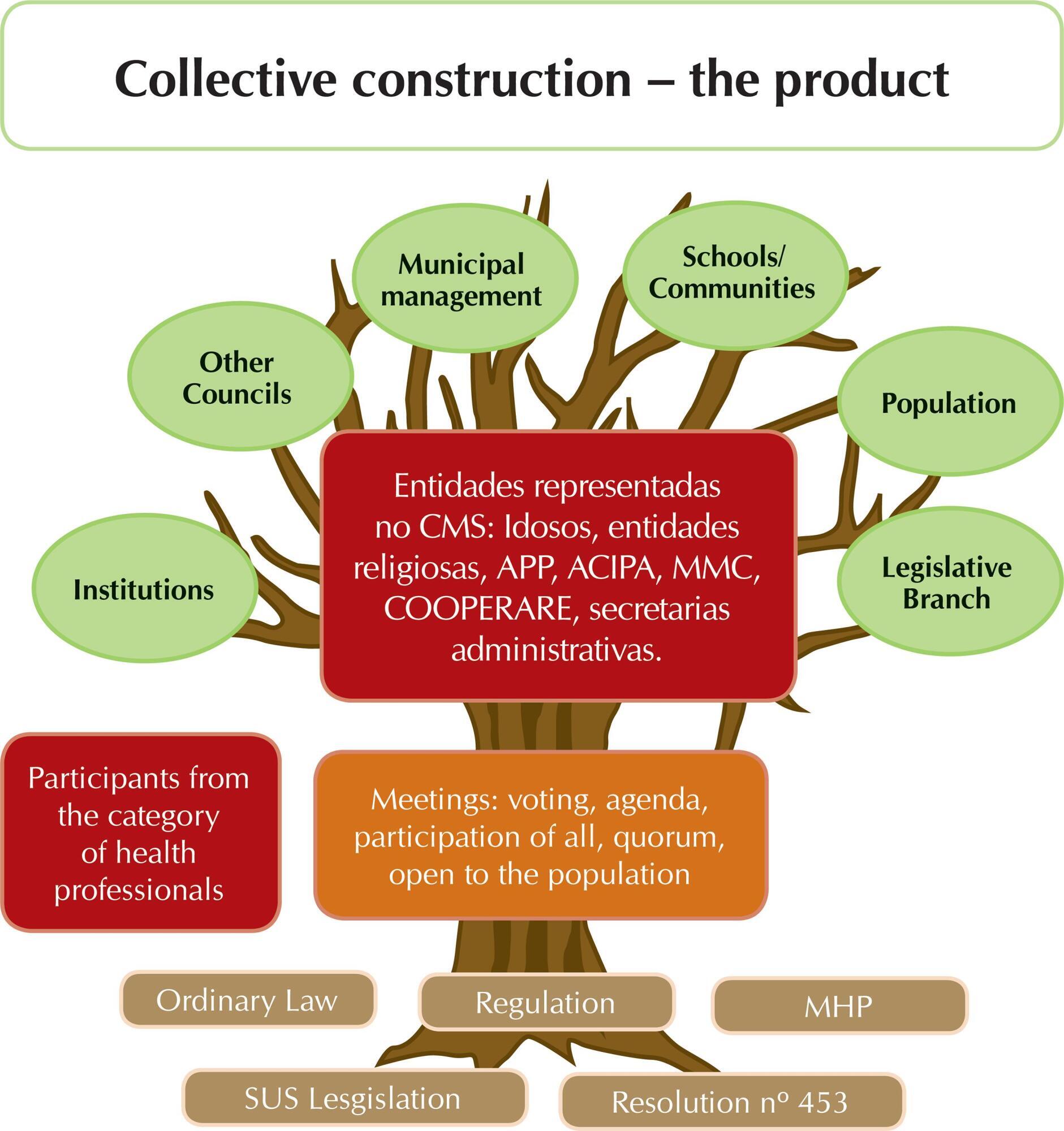
-
RESEARCH01-01-2018
Social network: evaluation of the support or containment contexts of lesbian mothers
Revista Brasileira de Enfermagem. 2018;71:490-495
Abstract
RESEARCHSocial network: evaluation of the support or containment contexts of lesbian mothers
Revista Brasileira de Enfermagem. 2018;71:490-495
DOI 10.1590/0034-7167-2017-0419
Views0See moreABSTRACT
Objective:
To evaluate the social network of lesbian mothers, from the social contexts of support or restraint.
Method:
Descriptive, exploratory study, of qualitative approach, based on the theoretical reference of Social Network, with eight lesbian mothers selected through Snowball technique, using semi-structured interview. Data analysis was performed with IRAMUTEQ software, through Similarity Analysis.
Results:
The social network is configured as: 1) Emotional distance and non-acceptance of motherhood by the family members – primary network elements; 2) Interference in the socio-cultural medium for the effectiveness of the mother-child bond – secondary network elements.
Final considerations:
Social network is grounded on trivialized and negative conceptions that highlight prejudice and disrespect. The discussion of this theme contributes to a greater visibility of those new family arrangements as well as to reduce stigmas e prejudices that pervade the social network components of these women.
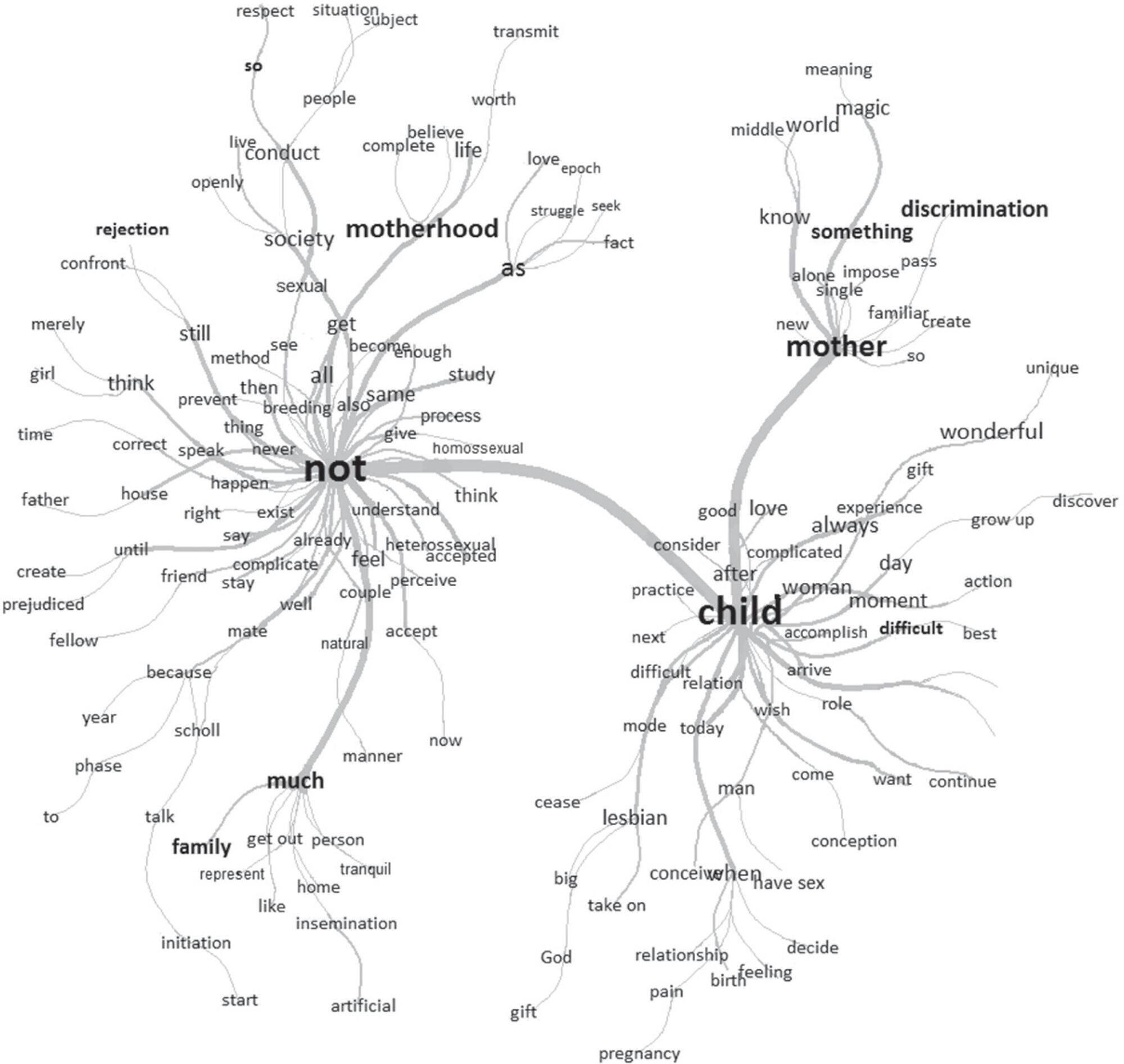
-
RESEARCH01-01-2018
Wellness room as a strategy to reduce occupational stress: quasi-experimental study
Revista Brasileira de Enfermagem. 2018;71:483-489
Abstract
RESEARCHWellness room as a strategy to reduce occupational stress: quasi-experimental study
Revista Brasileira de Enfermagem. 2018;71:483-489
DOI 10.1590/0034-7167-2017-0572
Views0See moreABSTRACT
Objective:
To compare occupational stress levels of nurse staff working in the surgical unit before and after the intervention “wellness room”.
Method:
Quasi-experimental study with a sample of 60 nurse staff working in a surgical unit of a teaching hospital in the Southern Region of Brazil. The intervention was conducted in a room in the workplace for six months and consisted of sections of aesthetic care, relaxation, lectures and workshops to reduce occupational stress. Data were collected through the Demand-Control-Support Questionnaire before and after the intervention, and the comparative analysis was performed by the Wilcoxon test.
Results:
After the intervention, there was a decrease in demand and an increase in control and in the social support received at work in all professional categories, but the differences were not statistically significant.
Conclusion:
The intervention “wellness room” reduced occupational stress levels in the sample studied; however, it was not a significant decrease.
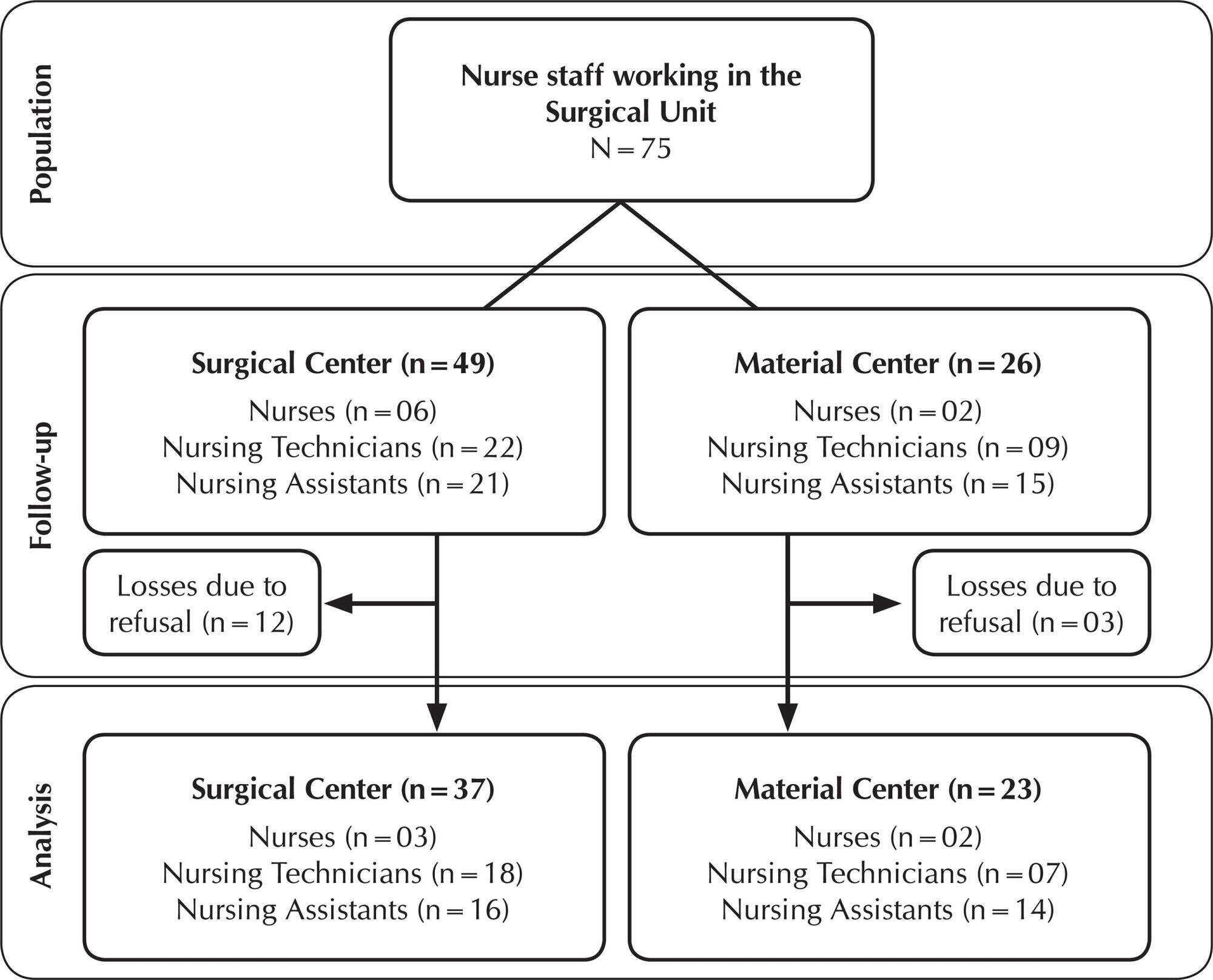
-
RESEARCH01-01-2018
Characterization of users at risk of developing diabetes: a cross-sectional study
Revista Brasileira de Enfermagem. 2018;71:475-482
Abstract
RESEARCHCharacterization of users at risk of developing diabetes: a cross-sectional study
Revista Brasileira de Enfermagem. 2018;71:475-482
DOI 10.1590/0034-7167-2017-0776
Views0See moreABSTRACT
Objective:
To characterize the profile of users at risk of developing diabetes mellitus type 2 according to sociodemographic and clinical variables.
Method:
Cross-sectional study, descriptive, quantitative approach conducted with 266 users of Basic Care. Inferential statistics analysis, calculating the crude prevalence ratio with confidence interval of 95% and Kruskal-Wallis test, and application of the multivariate technique simple Correspondence Analysis.
Results:
It was noted that 83.1% were women and 36.4% frequented the Family Health Unit from 1 to 5 years. Regarding the factors associated with diabetes mellitus type 2, 66.5% of the users were overweight and 77.9% were rated with central obesity. The great majority, 77.4%, did not practice physical activities and 21.1% had altered glycemia.
Conclusion:
The results showed that many risk factors for developing diabetes mellitus type 2 were among the population of the study.
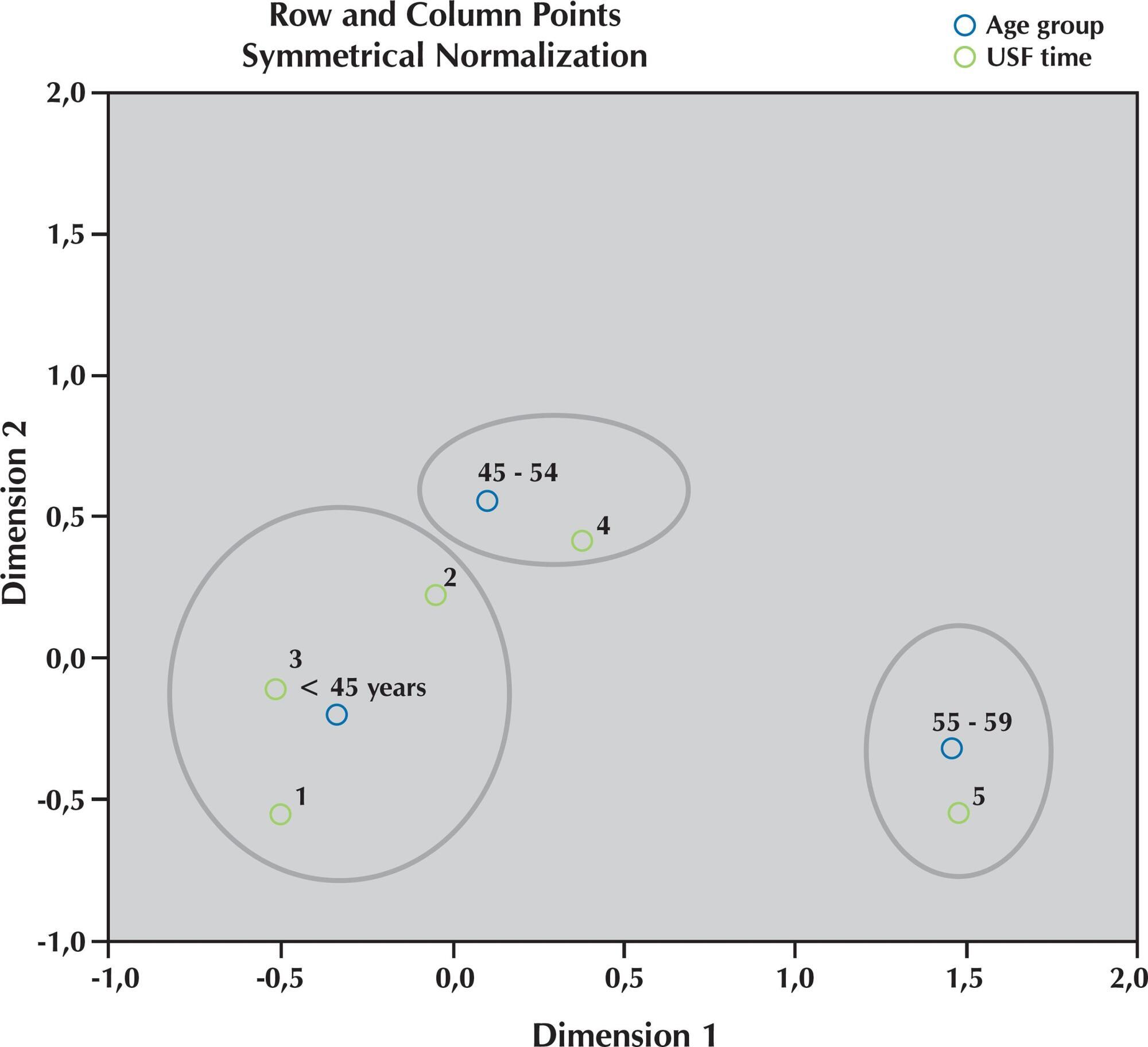
-
ORIGINAL ARTICLE07-08-2020
No to distance education! Production of meaning of discourses of nursing representative entities
Revista Brasileira de Enfermagem. 2020;73(5):e20190465
Abstract
ORIGINAL ARTICLENo to distance education! Production of meaning of discourses of nursing representative entities
Revista Brasileira de Enfermagem. 2020;73(5):e20190465
DOI 10.1590/0034-7167-2019-0465
Views0See moreABSTRACT
Objectives:
to analyze the processes of production of meanings, based on the positions of Brazilian nursing representative entities, on distance education, considering the implications for nursing as a discipline, profession and work.
Methods:
this documentary research was carried out in sources from the Federal Nursing Council and Associação Brasileira de Enfermagem, from 2015 to 2018. Data were examined from discourse analysis, using paraphrase and polysemy as analytical devices.
Results:
they were organized based on the effects of meanings produced and affiliated to two analytical categories: “Forms of mobilization and operating entities” and “Basis and justifications for the positions”.
Final Considerations:
the discourses signal concern about the future training of new professionals. Resistance, participation, visibility, broad and emphatic debate on the topic are shown as strategies for coping and defending a training process less captured by neoliberal logic, and more relational and committed to the quality of health care.

-
ORIGINAL ARTICLE07-13-2020
Culture of patient safety in hospital units of gynecology and obstetrics: a cross-sectional study
Revista Brasileira de Enfermagem. 2020;73(5):e20190576
Abstract
ORIGINAL ARTICLECulture of patient safety in hospital units of gynecology and obstetrics: a cross-sectional study
Revista Brasileira de Enfermagem. 2020;73(5):e20190576
DOI 10.1590/0034-7167-2019-0576
Views0See moreABSTRACT
Objectives:
to assess the patient safety culture of the health team working in three maternity hospitals.
Methods:
observational, cross-sectional, comparative study. 301 professionals participated in the study. The Hospital Survey on Patient Safety Culture questionnaire validated in Brazil was used. For data analysis, it was considered a strong area in the patient safety culture when positive responses reached over 75%; and areas that need improvement when positive responses have reached less than 50%. To compare the results, standard deviation and thumb rule were used.
Results:
of the 12 dimensions of patient safety culture, none obtained a score above 75%, with nine dimensions scoring between 19% and 43% and three dimensions between 55% and 57%.
Conclusions:
no strong dimensions for safety culture were identified in the three maternity hospitals. It is believed that these results may contribute to the development of policies that promote a culture of safety in institutions.
-
REVIEW07-13-2020
The quality of life of family health professionals: a systematic review and meta-synthesis
Revista Brasileira de Enfermagem. 2020;73(5):e20190645
Abstract
REVIEWThe quality of life of family health professionals: a systematic review and meta-synthesis
Revista Brasileira de Enfermagem. 2020;73(5):e20190645
DOI 10.1590/0034-7167-2019-0645
Views1See moreABSTRACT
Objectives:
to perform a systematic review and meta-synthesis of qualitative studies about the work-related quality of life of Family Health Strategy professionals.
Methods:
this systematic review was developed to answer the following PVO question: “Which factors (variables) are associated with the work-related quality of life (outcome) of Family Health Strategy professionals (population)?” The PubMed, Scopus, Embase, SciELO, Web of Science, LILACS, Science Direct, OpenThesis, OpenGrey, and OATD databases were selected. The meta-synthesis analyzed the main codes and secondary codes of all included studies.
Results:
the database search resulted in 1,744 reports; six were considered eligible for the meta-synthesis. Four factors were considered for the quality of work life: working conditions; work processes; interpersonal relationships; and personal aspects.
Conclusions:
although this study confirms the adequacy of aspects commonly related to the quality of work life, other factors are important in the case of FHS professionals, especially work context.

-
LETTER TO THE EDITOR07-01-2020
Letter to the Editor: doubts and considerations about Coronary Syndrome
Revista Brasileira de Enfermagem. 2020;73(5):e2020730502c
Abstract
LETTER TO THE EDITORLetter to the Editor: doubts and considerations about Coronary Syndrome
Revista Brasileira de Enfermagem. 2020;73(5):e2020730502c
DOI 10.1590/0034-7167.2020730502c
Views0Dear Editor,We wrote this letter referring to the article “Impact of anxiety and depression on morbidity and mortality of patients with coronary syndrome”() to make some comments, in order to clarify doubts that we were missing from answering. We have already made it clear that our intention is not to question the work of the […]See more -
ORIGINAL ARTICLE08-10-2020
Workers’ Health in Brazil: Accidents recorded by Social Security from 2008 to 2014
Revista Brasileira de Enfermagem. 2020;73(6):e20180892
Abstract
ORIGINAL ARTICLEWorkers’ Health in Brazil: Accidents recorded by Social Security from 2008 to 2014
Revista Brasileira de Enfermagem. 2020;73(6):e20180892
DOI 10.1590/0034-7167-2018-0892
Views0See moreABSTRACT
Objectives:
to analyze the incidence of occupational accidents in Brazil, recorded by Social Security according to the geographic regions, age group, gender and their prevalence according to the causes and branch of economic activity.
Methods:
ecological descriptive study with time series analysis from 2008 to 2014. Data on the beginning and end of the historical series were compared in each ecological unit studied.
Results:
the South and Southeast regions, male, between 20 and 49 years of age presented the highest falls in incidence. 70.87% of the causes occurred in group XIX of ICD-10. The economic activity with the highest prevalence of accidents was the manufacturing industry.
Conclusions:
accidents at work have decreased in Brazil, however, the incidence is still high. Advances need to be made in the recording of accidents and in the prevention and surveillance of workers’ health.
-
ORIGINAL ARTICLE08-10-2020
Neonatal near miss in the intensive care unit
Revista Brasileira de Enfermagem. 2020;73(6):e20180931
Abstract
ORIGINAL ARTICLENeonatal near miss in the intensive care unit
Revista Brasileira de Enfermagem. 2020;73(6):e20180931
DOI 10.1590/0034-7167-2018-0931
Views0See moreABSTRACT
Objective:
To analyze near miss cases among newborns hospitalized in the Intensive Care Unit.
Methods:
An observational, cross-sectional, retrospective study using the STROBE guideline. Data were collected from 1,101 records of live births (newborns). Statistical analysis used the Epi-Info program 3.3.2 and Chi-square and Fisher’s exact tests.
Results:
A total of 162 newborns were hospitalized, of which 63 had at least one criterion of near miss. The variables that remained associated with neonatal near miss were weight <1.750 g, gestational age <33 weeks and Apgar at 5 minutes <7, pragmatic criteria to identify cases of neonatal near miss morbidity.
Conclusion:
Prematurity and low birth weight were the factors that contributed most to the near miss outcome among newborns hospitalized in intensive care, a rate two and a half times higher than the number of deaths, according to scientific evidence.

-
08-10-2020
Care for the critical patient undergoing point-of-care testing: integrative review
Revista Brasileira de Enfermagem. 2020;73(6):e20180948
Abstract
Care for the critical patient undergoing point-of-care testing: integrative review
Revista Brasileira de Enfermagem. 2020;73(6):e20180948
DOI 10.1590/0034-7167-2018-0948
Views0See moreABSTRACT
Objective:
to identify, based on the evidence, point-of-care testing in bedbound in critically ill patients.
Method:
integrative review, carried out through search in Pubmed, Virtual Health Library, Joanna Briggs Institute, The British Institute of Radiology, Brazilian Radiology, and Google Scholar databases. We used the PICO research strategy and selected articles published from 2013 onwards, which presented information about point-of-care testing.
Results:
the different interventions found in the analysis of the 23 selected articles allowed the thematic grouping of care related to safety in communication, patient identification, care with devices, and the prevention and control of infection, which can be used in point-of-care testing.
Final considerations:
The care described in the evidence provided support for validating a safe care protocol for critically ill patients undergoing imaging studies in bed.

-
ORIGINAL ARTICLE08-10-2020
Risk management in the scope of nursing professionals in the hospital setting
Revista Brasileira de Enfermagem. 2020;73(6):e20190303
Abstract
ORIGINAL ARTICLERisk management in the scope of nursing professionals in the hospital setting
Revista Brasileira de Enfermagem. 2020;73(6):e20190303
DOI 10.1590/0034-7167-2019-0303
Views1See moreABSTRACT
Objective:
To evaluate occupational hazards affecting nursing professionals’ health in the environment of the hospital.
Method:
Descriptive-exploratory research with a qualitative approach.
Results:
The main hazards affecting nursing professionals were work overload due to the large number of patients or the small number of professionals, inadequate infrastructure, and insufficient organizational management. It became evident the work interferences in the nursing professional’s life are enormous. Despite the existence of health occupational risk management, there is still a shortage of bigger endeavors to be employed in the hospital routine. As a main result of the study, a Standard Operational Protocol (SOP) for biological risk was created to be applied in a hospital setting.
Conclusion:
Based on the identification of occupational hazards, it was suggested the Standard Operational Protocol which should be standardized to manage biological occupational hazards, to ensure the adequate flow of procedures after the exposure, as well as the occupational safety of nursing professionals.
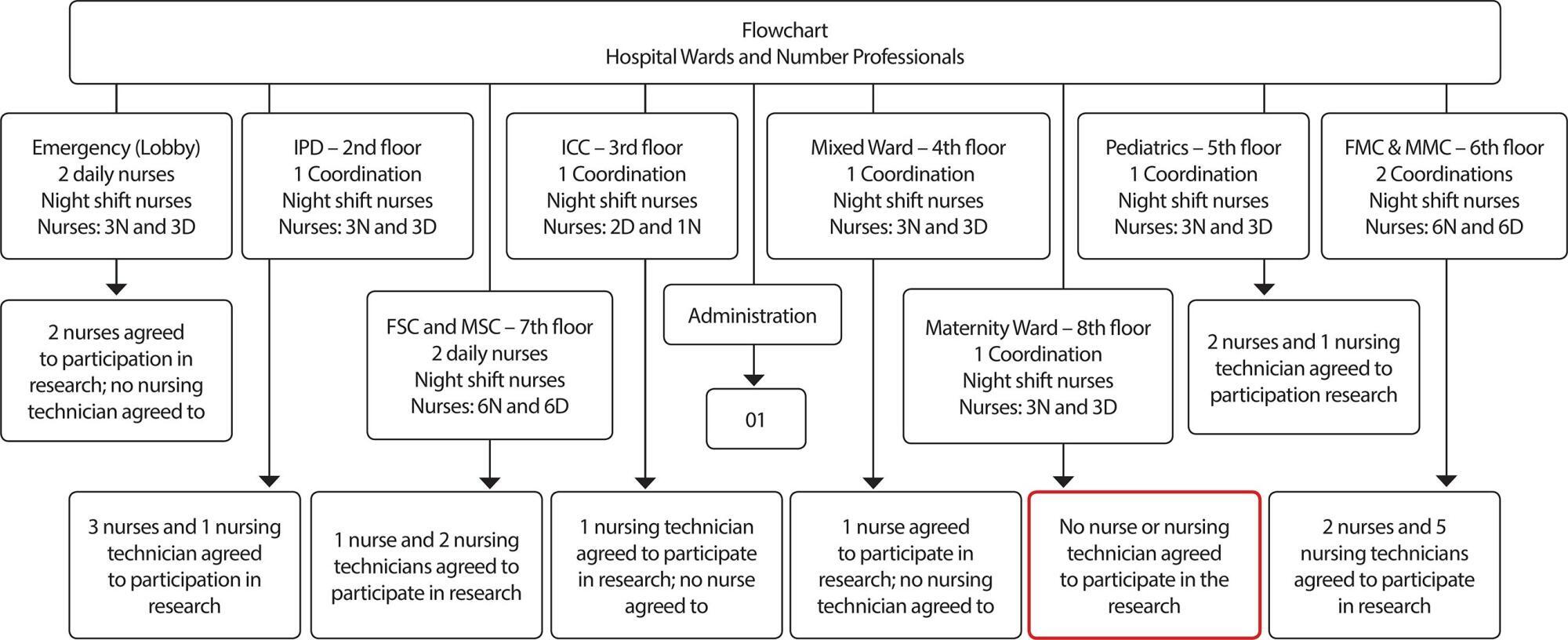
-
REFLECTION07-01-2020
How to translate scientific knowledge into practice? Concepts, models and application
Revista Brasileira de Enfermagem. 2020;73(5):e20190179
Abstract
REFLECTIONHow to translate scientific knowledge into practice? Concepts, models and application
Revista Brasileira de Enfermagem. 2020;73(5):e20190179
DOI 10.1590/0034-7167-2019-0179
Views0See moreABSTRACT
Objectives:
to present the concept of Knowledge Translation and Exchange as it has been used in the international literature and in Canada, particularly. Next, to describe a renowned conceptual model to guide its implementation, entitled Knowledge-to-Action Cycle.
Results:
we described the use of the model in the context of the municipal primary health care system in southern Brazil for the implementation of pain management strategies during vaccination.
Conclusions:
in this theoretical reflection, we argue that in order to promote health equity and quality of care in the Unified Health System (Brazilian SUS) it is important to translate scientific knowledge to various practice settings and create opportunities for exchange with users of this knowledge, such as health professionals, managers, policy makers, patients, family members and other stakeholders.

-
ORIGINAL ARTICLE08-18-2021
Effects of floral therapy on labor and birth: a randomized clinical trial
Revista Brasileira de Enfermagem. 2021;74:e20210079
Abstract
ORIGINAL ARTICLEEffects of floral therapy on labor and birth: a randomized clinical trial
Revista Brasileira de Enfermagem. 2021;74:e20210079
DOI 10.1590/0034-7167-2021-0079
Views0INTRODUCTIONThe Policy of Comprehensive Attention to Women’s Health focuses on improving obstetric care. One of the points observed in the Program of Comprehensive Attention to Women’s Health is the monitoring of pacts to reduce the rate of cesarean sections in hospitals of the Brazilian Unified Health System (SUS – Sistema Único de Saúde), rescuing the […]See more
-
ORIGINAL ARTICLE08-14-2020
Education to prevent ventilator-associated pneumonia in intensive care unit
Revista Brasileira de Enfermagem. 2020;73(6):e20190477
Abstract
ORIGINAL ARTICLEEducation to prevent ventilator-associated pneumonia in intensive care unit
Revista Brasileira de Enfermagem. 2020;73(6):e20190477
DOI 10.1590/0034-7167-2019-0477
Views0INTRODUCTIONVentilator-Associated Pneumonia (VAP) is one of the complications related to the care of patients hospitalized in the Intensive Care Unit (ICU), which, according to consulted authors, exceeds the mortality rates of other Healthcare Related Infections (HRI). VAP is the second most frequent infection in patients admitted to the ICU, as well as the most prevalent […]See more
-
ORIGINAL ARTICLE10-21-2019
Burnout assessment in nurses from a general emergency service
Revista Brasileira de Enfermagem. 2019;72(6):1457-1463
Abstract
ORIGINAL ARTICLEBurnout assessment in nurses from a general emergency service
Revista Brasileira de Enfermagem. 2019;72(6):1457-1463
DOI 10.1590/0034-7167-2017-0870
Views0See moreABSTRACT
Objective:
To assess the level of Burnout among nurses in a general emergency department.
Method:
Quantitative, descriptive, correlational and cross-sectional study. 32 nurses from a general adult emergency department answered a questionnaire to evaluate Burnout. (Copenhagen Burnout Inventory).
Result:
It was verified that 59.4% of the nurses presented total Burnout. Work-related burnout was the subscale with the highest average score. It was found that the lower the age and the longer the time working in the institution, the higher the level of Burnout. Longer professional experience was related to lower levels of Burnout. There were also higher scores of Burnout among participants who thought about changing their profession, their institution or their service.
Conclusion:
The prevalence of Burnout is high. Professional Burnout was the most critical subscale. Age and the current work are the subscales that most influence perceived Burnout
-
ORIGINAL ARTICLE07-10-2020
Nursing appeals on social media in times of coronavirus
Revista Brasileira de Enfermagem. 2020;73:e20200225
Abstract
ORIGINAL ARTICLENursing appeals on social media in times of coronavirus
Revista Brasileira de Enfermagem. 2020;73:e20200225
DOI 10.1590/0034-7167-2020-0225
Views0See moreABSTRACT
Objective:
to know and analyze the nursing appeals on social media during the COVID-19 pandemic.
Method:
it is a documentary, qualitative, descriptive, and exploratory research with data collected in publications in two social media. Two hundred ninety-five publications of nursing professionals published on Twitter and Instagram between March 11 and 20, 2020 were submitted to content analysis using ATLAS.ti resources.
Results:
four thematic categories emerged: #stayathome, #whereismyPPE, #nowweareheroes, #nothingnewinthefrontline, according to frequency of communications. The appeals show a relationship with the social relevance of nursing professional work and with the conditions required for its exercise.
Final considerations:
old and new challenges of the profession were placed on the agenda in social media, especially related to the workforce and instruments of labor. These speeches can serve as a foundation for policies to improve working conditions and promote appreciation of the profession.

-
REFLECTION10-21-2019
Clinical supervision and preceptorship/tutorship: contributions to the Supervised Curricular Internship in Nursing Education
Revista Brasileira de Enfermagem. 2019;72(6):1730-1735
Abstract
REFLECTIONClinical supervision and preceptorship/tutorship: contributions to the Supervised Curricular Internship in Nursing Education
Revista Brasileira de Enfermagem. 2019;72(6):1730-1735
DOI 10.1590/0034-7167-2018-0785
Views0See moreABSTRACT
Objective:
To reflect on the contributions of the clinical supervision and preceptorship/tutorship as means to approach and engage nurses of healthcare services in activities related to the Supervised Curricular Internship, discussing conceptual, theoretical, and practical approaches for higher education in nursing.
Method:
This is a reflection based on the discursive formulation concerning clinical supervision and preceptorship/tutorship.
Results:
Clinical supervision has been widely used by international healthcare institutions to qualify the work processes of nurses, supporting their self-development. Currently, is has been supporting the work of nurses who are preceptors/tutors and monitors students on clinical internships.
Final considerations:
The clinical supervision of nursing students features a robust and effective strategy for the development of interns and for the completion of the teaching-service integration.
-
08-19-2019
Degree in Nursing: education through problem-based learning
Revista Brasileira de Enfermagem. 2019;72(4):1071-1077
Abstract
Degree in Nursing: education through problem-based learning
Revista Brasileira de Enfermagem. 2019;72(4):1071-1077
DOI 10.1590/0034-7167-2018-0298
Views0See moreABSTRACT
Objective:
To describe how undergraduate courses in Nursing are using the problem-based learning (PBL).
Method:
Integrative literature review, from searches in the databases Education Resources Information Center (ERIC), Latin American and Caribbean Health Sciences Literature (Lilacs), and PubMed, from 2010 to 2015. 36 articles were analyzed.
Results:
A teaching method used in all continents, the PBL enables improvement of the critical thinking, autonomy, motivation for learning, active search attitude, ability to work in teams, and problem-solving. Difficulties and challenges relate to the training of students and teachers to understand the principles of the method.
Final considerations:
The benefits of PBL coincide with the needs of nursing training, but its applicability demands constant review in seeking to develop the skills necessary for this training.

-
ORIGINAL ARTICLE06-01-2020
Construction and validation of an educational technology for mother-child bond in the neonatal intensive care unit
Revista Brasileira de Enfermagem. 2020;73(4):e20190083
Abstract
ORIGINAL ARTICLEConstruction and validation of an educational technology for mother-child bond in the neonatal intensive care unit
Revista Brasileira de Enfermagem. 2020;73(4):e20190083
DOI 10.1590/0034-7167-2019-0083
Views0See moreABSTRACT
Objectives:
to describe the process of construction and validation of an educational booklet to promote bonding between mothers and newborns in a Neonatal Intensive Care Unit.
Methods:
methodological study developed through data collection in the literature and with the target audience; construction of the booklet; qualification of the material through validation by judges (health and communication experts/designer) and assessment by the target audience (mothers of at-risk newborns). Data were analyzed descriptively.
Results:
booklet content was validated, obtaining an overall Content Validity Index of 0.92. Appearance was rated “Superior” with 80% percentage. Mothers performed an assessment with 100% agreement between the items.
Conclusions:
the booklet was validated in all domains assessed and can be used by mothers with children hospitalized in the Neonatal Unit.

Search
Search in:
Nuvem de Tags
Adolescente (85) Atenção Primária à Saúde (239) COVID-19 (91) Criança (91) Cuidados de Enfermagem (269) Educação em Enfermagem (151) Educação em Saúde (139) Enfermagem (930) Enfermagem Pediátrica (86) Estudantes de Enfermagem (77) Estudos de Validação (131) Família (87) Idoso (208) Promoção da Saúde (99) Qualidade de Vida (104) Saúde do Trabalhador (86) Saúde Mental (145) Saúde Pública (82) Segurança do Paciente (150) Tecnologia Educacional (100)



